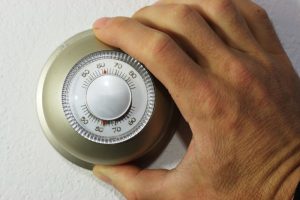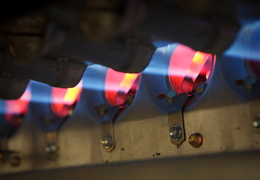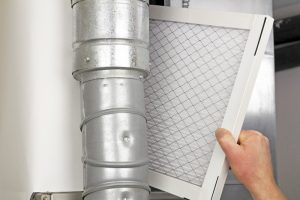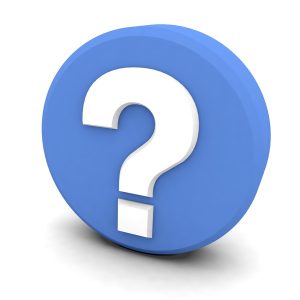 We are pretty fortunate in our area that we don’t have to deal with the severely cold temperatures that homeowners contend with throughout other parts of the country. As a result, you don’t have to worry about your heating system too much, right? However, even if our heater usage is relatively brief, don’t you want to do everything possible to save energy, and subsequently, money?
We are pretty fortunate in our area that we don’t have to deal with the severely cold temperatures that homeowners contend with throughout other parts of the country. As a result, you don’t have to worry about your heating system too much, right? However, even if our heater usage is relatively brief, don’t you want to do everything possible to save energy, and subsequently, money?
A faulty thermostat, or even how you use your thermostat, can play a big role in this—not only as winter approaches and we start using our heaters but also during the cooling season. We’re here for you when you do need expert service and advice, but in the meantime we’d like to help you understand a bit more the relationship between your thermostat and HVAC system, so you know when to call our team for help.

 Wouldn’t it be nice if someone could create an HVAC system that was completely noiseless? Trust us, if they invented this we’d be first in line to install them! But the fact of the matter is, you’re going to hear your furnace making noises. You’ll hear the ductwork fluctuating as temperatures change, and you’ll hear your furnace cycling on and shutting off, plus the whoosh of air coming through your vents.
Wouldn’t it be nice if someone could create an HVAC system that was completely noiseless? Trust us, if they invented this we’d be first in line to install them! But the fact of the matter is, you’re going to hear your furnace making noises. You’ll hear the ductwork fluctuating as temperatures change, and you’ll hear your furnace cycling on and shutting off, plus the whoosh of air coming through your vents. If you’re looking for a new furnace this time of year, then you understandably have a lot on your plate. And with options to consider like what fuel type to use, the AFUE vs. HSPF ratings, whether to go with electrical or gas, etc. you may be tempted to go with the first furnace that fits your budget just to get the process over with.
If you’re looking for a new furnace this time of year, then you understandably have a lot on your plate. And with options to consider like what fuel type to use, the AFUE vs. HSPF ratings, whether to go with electrical or gas, etc. you may be tempted to go with the first furnace that fits your budget just to get the process over with. Are you worried that your furnace system might break down at any moment? If you skipped maintenance this year, and/or you don’t know the signs that your furnace needs repair, then we understand the worry.
Are you worried that your furnace system might break down at any moment? If you skipped maintenance this year, and/or you don’t know the signs that your furnace needs repair, then we understand the worry. Okay, it was still in the 90s last week… so why, exactly, are we talking about heating?
Okay, it was still in the 90s last week… so why, exactly, are we talking about heating? The short answer to this is, “no.” No matter what type of thermostat you have and how professionally installed it is, it cannot directly prevent furnace problems. What the right thermostat can do, however, is help you use your furnace more efficiently, preventing high energy costs—which is just as important!
The short answer to this is, “no.” No matter what type of thermostat you have and how professionally installed it is, it cannot directly prevent furnace problems. What the right thermostat can do, however, is help you use your furnace more efficiently, preventing high energy costs—which is just as important! You may have read in one of our other blog posts that we recommend changing your air filter every 1-3 months. We aren’t just saying this because it’s a nice thing to do—it will actually help you get the most effective and efficient use out of your heating and cooling systems as possible. And consider how much we use either one of these HVAC systems, chances are that you’d like to do anything you can to save money when you use them, and prevent repairs.
You may have read in one of our other blog posts that we recommend changing your air filter every 1-3 months. We aren’t just saying this because it’s a nice thing to do—it will actually help you get the most effective and efficient use out of your heating and cooling systems as possible. And consider how much we use either one of these HVAC systems, chances are that you’d like to do anything you can to save money when you use them, and prevent repairs. How do you prepare your heating and cooling systems for their respective seasons? Without argument, the best way to do this is by scheduling routine system maintenance. Maintenance tune-ups give our pros the chance to fully inspect your system, making any adjustments needed, cleaning the unit, and alerting you to any repair needs that exist. The best time to have this done is typically in the fall for your heater and in the spring for your air conditioner—but it’s actually more important that you have in done regularly, no matter the time of year.
How do you prepare your heating and cooling systems for their respective seasons? Without argument, the best way to do this is by scheduling routine system maintenance. Maintenance tune-ups give our pros the chance to fully inspect your system, making any adjustments needed, cleaning the unit, and alerting you to any repair needs that exist. The best time to have this done is typically in the fall for your heater and in the spring for your air conditioner—but it’s actually more important that you have in done regularly, no matter the time of year. The short answer to this is “yes!” But there are definitely some factors to consider, which we’ll get to below.
The short answer to this is “yes!” But there are definitely some factors to consider, which we’ll get to below. We may not get the frigid temperatures here in Lawrenceville that other parts of the country gets, but given how hot and muggy our summers get, our winters can certainly seem pretty chilly! As a result, we’re always grateful for the use of effective and efficient heating systems. But is yours working as efficiently as it could be?
We may not get the frigid temperatures here in Lawrenceville that other parts of the country gets, but given how hot and muggy our summers get, our winters can certainly seem pretty chilly! As a result, we’re always grateful for the use of effective and efficient heating systems. But is yours working as efficiently as it could be?